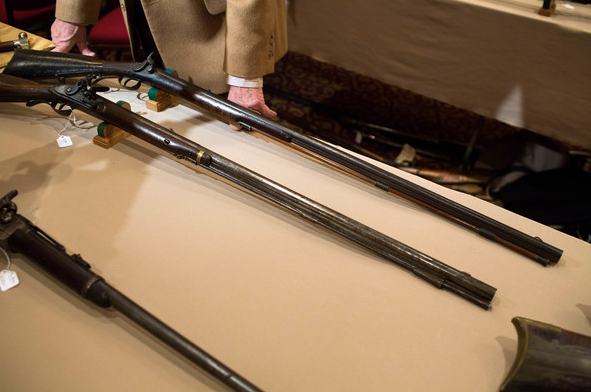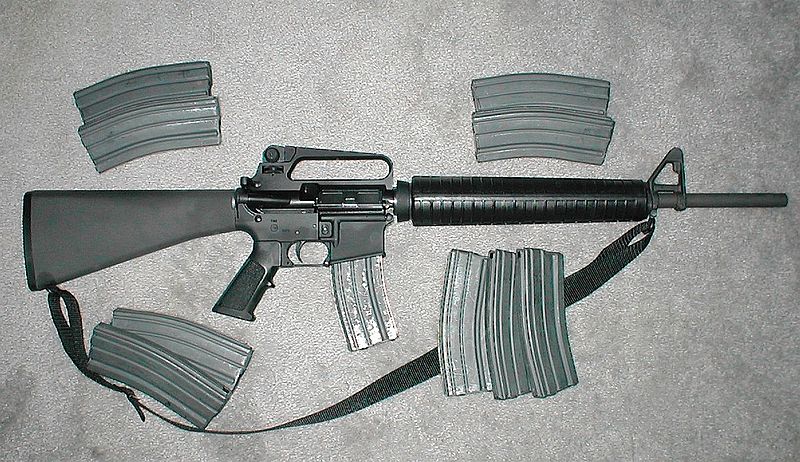“A well regulated Militia, being necessary to the security of a free State, the right of the people to keep and bear arms, shall not be infringed.” — Second Amendment, U.S. Constitution
The children of Sandy Hook Elementary School returned to their classrooms this past week; President Obama reiterated that solving the “gun problem” would be among his highest priorities in the weeks ahead, even as Republican leaders in the Senate insist that the only issues that will receive any serious attention in the coming months will be the deficit; and nearly 400 people have died in gun related events since the Sandy Hook massacre, including four people yesterday in a townhouse in Aurora, CO. And the beat goes on, for as gun advocates never tire of reminding us, the Constitution guarantees their absolute “right to keep and bear arms.”
The problem here is that when gun advocates reiterate this clause of the Constitution, which has taken on the quality of a sacred mantra, they forget that it is qualified by a preceding clause that links the absolute right to ownership to the necessity of maintaining “a well regulated Militia” for “the security of a free State.” This was a time, we might recall, when “standing armies” were seen as something of a threat to freedom and liberty—think British Redcoats—and calling out of the Militia required individual soldiers to supply their own weapons. I don’t know for certain, but I seriously doubt that the U.S. military currently even allows soldiers to bring their own weapons with them when they are called to duty, let alone requires it as part of maintaining a “well regulated Militia.” The point here is not that we should eliminate the right to keep and bear arms, but that the conditions that animated the original intent of this amendment no longer abide. And given that fact, it surely makes sense to reconsider the standing of the right as an “absolute,” as well as the regulations needed to secure a “free State,” especially given changed and changing weapons technologies and circumstances.
But there is a second point to be made as well. The “arms” that the Founders had in mind were the sort of single file muzzle loaders seen in the photograph above and on display at the East Coast Fire Arms antique gun show sponsored this past week in Stamford, CT, not the Bushmaster semi-automatic, military-style assault rifle with thirty bullet clips—seen below— and used to take the lives of twenty school children and six others at the Sandy Hook Elementary School in Newtown, CT on December 14th.
If Adam Lanza, the mass murderer who wrought havoc and tragedy on the village of Sandy Hook, was carrying a muzzle loader it is possible that one person might have been injured or died instead of twenty-six. One person. At most. Maybe. And that is something that we should bear in mind every time we hear the Constitutional invocation of an absolute right “to keep and bear arms” used to justify the ownership of semi-automatic weapons.
Photo Credit: Christopher Capozziello/Getty Images North America; Anon/Wikipedia. Cross-posted at BAGnewsNotes.


So, freedom of speech shouldn’t apply to the internet, because when the 1st amendment was drafted, it didn’t exist?
Lee: You miss the point completely. My point is that we need to revise our understanding based on changing circumstances. That is why we would say that the 1st Amendment applies to the internet even though it would not have been recognized as “speech” in 1789. But change is not in only one direction. The 2nd Amendment, as originally constituted, was NOT an absolute right, but a right instituted in a particular context. Since the context no longer abides it makes good sense to revise it, BUT not as an ever expanding ABSOLUTE. It needs to be interpreted and used sensibly in its current context. And while you and I might disagree over whether or not there is good reason to defend the private ownership of semi-automatic weapons the argument should NOT hinge on an absolute right predicated on conditions that no longer abide.
I don’t consider the 2nd amendment as “everybody has the right to buy and own every weapon anytime”. But I don’t agree on the “muzzle loader”-argument.
I believe in “well regulated”. Gun ownership after:
– background check
– evaluation of skills
– psychological evaluation
– proof of adequate storage
– no criminal record
– registration (for handguns and semiauto rifles) without loophooles
Lee: I wish you were the president of the NRA.
The two antagonists in the gun debate seem to argue completely different issues. The left says that there is no need for military style weapons, large capacity magazines, and that more and background checks are necessary. The left says, we don’t really have a problem with guns for hunting or sport shooting, and we can kind of understand a weapon in the home for self-defense, but these particular weapons are going to far.
The right, on the other hand, defends military style weapons and large magazines based on a fundamental belief that they can be used to protect themselves, ultimately, against the government if/when fascism takes hold and people are being “rounded up and sent to camps.”
The left has largely failed to address this stance. They dismiss it as conspiratorial and insane, which maybe it is–but, it is a motivating argument for the gun folks.
Until the left is willing to address this issue more fully it will look like an end run around their big issue.
Now, I don’t hear the gun folks arguing that Japanese-Americans should have whipped out guns when they were rounded up after Pearl Harbor; nor do we hear defenses of American Indians who were fighting coercive government military forces that wanted to round them up and move/kill them (guilty or not, Leonard Peltier is still in jail). And I don’t hear claims that black and latino citizens in NYC, who are subject to stop and frisk based on profiling (until the court case that came down today) should have been able to defend their person by jacking up the cops. The examples go on and on–see the criticism from the right of Django Unchained and the desire to “kill white people”–but in all this, the “protect myself from the government” argument does have an affective appeal.
None of which has anything to do with visual rhetoric, but it does suggest that it might be productive as NRA opponents begin to crank up, to imagine how efforts to make gun laws more moderate might be seen.
This is a good article from the Atlantic on how the gun folks have their priorities out of whack.
http://www.theatlantic.com/politics/archive/2013/01/the-strangest-conservative-priority-prepping-a-2nd-amendment-solution/266711/
Dave